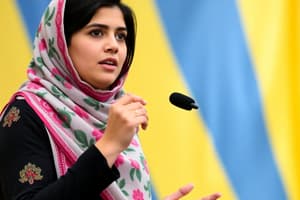Podcast
Questions and Answers
Considering the socio-political context of the Swat Valley, what rhetorical strategy did Moniba employ in her speech to counter prevailing stereotypes about Pashtuns following the rise of the Taliban?
Considering the socio-political context of the Swat Valley, what rhetorical strategy did Moniba employ in her speech to counter prevailing stereotypes about Pashtuns following the rise of the Taliban?
- Directly condemning the Taliban's actions while disavowing any association between Pashtun culture and terrorism, thus creating an 'us versus them' dichotomy.
- Using logical arguments supported by statistical data to disprove claims of Pashtun involvement in terrorist activities, aiming to persuade the external world of their peaceful nature.
- Adopting a conciliatory tone to appeal to moderate elements within the Taliban, seeking common ground based on shared religious beliefs and cultural heritage.
- Employing pathos by invoking shared cultural values and historical symbols of peace deeply rooted within Pashtun identity, thereby subtly disassociating the community from extremism. (correct)
Malala describes a transformation during her speech where she felt her voice became 'the voice of so many others.' What philosophical concept best describes this phenomenon, considering her socio-political context?
Malala describes a transformation during her speech where she felt her voice became 'the voice of so many others.' What philosophical concept best describes this phenomenon, considering her socio-political context?
- Hegelian dialectic, where Malala's individual consciousness becomes subsumed by the collective consciousness of marginalized girls seeking education.
- Platonic idealism, where Malala's speech is merely an imperfect reflection of a higher, universal form of collective female empowerment.
- Existentialist authenticity, where Malala's speech reflects her unique, individual experience that cannot represent the collective.
- Foucauldian discourse, where Malala becomes a vessel through which broader power dynamics and societal narratives about female education are articulated. (correct)
How does the narrative structure of Malala's account juxtapose personal moments of anxiety and self-doubt with public acts of defiance, and what is the literary effect of this juxtaposition?
How does the narrative structure of Malala's account juxtapose personal moments of anxiety and self-doubt with public acts of defiance, and what is the literary effect of this juxtaposition?
- It diminishes the impact of her public defiance by highlighting her underlying vulnerabilities, thus creating a sense of irony and undermining her credibility.
- It emphasizes the transformative power of public speaking by portraying her journey from a state of fear to one of empowerment, serving as a metaphor for personal growth.
- It creates dramatic irony by contrasting her internal anxieties with her external bravery, thus highlighting the performative nature of her activism and questioning its authenticity.
- It humanizes Malala's persona by showcasing the internal struggles that underpin her courageous actions, thereby enhancing the emotional resonance and emphasizing her resilience. (correct)
Considering Malala's habit of practicing speeches in the mirror amidst the chaos of her home, what psychological mechanism might explain this behavior in relation to her burgeoning activism?
Considering Malala's habit of practicing speeches in the mirror amidst the chaos of her home, what psychological mechanism might explain this behavior in relation to her burgeoning activism?
In what way might the portrayal of domestic life—aunts gossiping, uncles arguing, children playing—in Malala's narrative serve as a counterpoint to the larger socio-political issues she addresses, and what is the effect of this contrast?
In what way might the portrayal of domestic life—aunts gossiping, uncles arguing, children playing—in Malala's narrative serve as a counterpoint to the larger socio-political issues she addresses, and what is the effect of this contrast?
Considering the historical context of the Taliban's suppression of female education, what specific legal or philosophical argument could be used to challenge their actions, drawing from international human rights conventions?
Considering the historical context of the Taliban's suppression of female education, what specific legal or philosophical argument could be used to challenge their actions, drawing from international human rights conventions?
If Malala's speeches are viewed through the lens of postcolonial theory, how might her articulation of the importance of education for girls be interpreted as a form of resistance against neo-colonial power structures?
If Malala's speeches are viewed through the lens of postcolonial theory, how might her articulation of the importance of education for girls be interpreted as a form of resistance against neo-colonial power structures?
How could the concept of 'performativity,' as theorized by Judith Butler, be applied to analyze Malala's public speeches and actions in the context of challenging gender norms and advocating for female education?
How could the concept of 'performativity,' as theorized by Judith Butler, be applied to analyze Malala's public speeches and actions in the context of challenging gender norms and advocating for female education?
How do Malala's reflections on her speeches 'planting seeds all over the earth' resonate with ecological theories concerning the interconnectedness of humans and environment, and what broader implications can be drawn?
How do Malala's reflections on her speeches 'planting seeds all over the earth' resonate with ecological theories concerning the interconnectedness of humans and environment, and what broader implications can be drawn?
In what ways might the portrayal of Malala's mirror speeches be likened to Jacques Lacan's mirror stage theory, and what implications does this have for understanding her evolving sense of self?
In what ways might the portrayal of Malala's mirror speeches be likened to Jacques Lacan's mirror stage theory, and what implications does this have for understanding her evolving sense of self?
Flashcards
Peace Rally
Peace Rally
An assembly organized to express feelings against the Taliban's campaign to destroy girls' schools.
Moniba's Speech
Moniba's Speech
A powerful speech by Moniba highlighting Pashtuns as peace-loving people, not terrorists.
Malala's Message
Malala's Message
A message conveying the importance of education and the rights of girls.
Microphone Impact
Microphone Impact
Signup and view all the flashcards
Democracy at Khushal School
Democracy at Khushal School
Signup and view all the flashcards
School's Importance
School's Importance
Signup and view all the flashcards
Nervousness Before Speech
Nervousness Before Speech
Signup and view all the flashcards
Audience in the Mirror
Audience in the Mirror
Signup and view all the flashcards
Cultural Chaos at Home
Cultural Chaos at Home
Signup and view all the flashcards
Importance of Speaking Out
Importance of Speaking Out
Signup and view all the flashcards
Study Notes
Malala's Speech at School Assembly
- Malala and friends planned a peace rally at school
- The assembly was anticipated, but small
- A Pashto TV crew unexpectedly came to cover the event
- Malala felt a nervousness, but more comfortable in front of a camera
- The older girls spoke first about friends who left school due to fear
- Moniba, the public speaking champion spoke about the religion loving people
- Malala, feeling anxious and dry-mouthed, spoke about education
Malala's Experience Giving a Speech
- The microphone accentuated Malala's voice, making her feel like she was speaking to the world
- She felt like the wind would carry her words like pollen
- She started a habit of practicing speeches in the mirror
- Homes were usually full of people and chaos, so she escaped into the bathroom to reflect
- It was not just her in the mirror; she saw many other faces listening to her
- The mother's voice brought Malala out of her reflective daydreaming
Studying That Suits You
Use AI to generate personalized quizzes and flashcards to suit your learning preferences.




